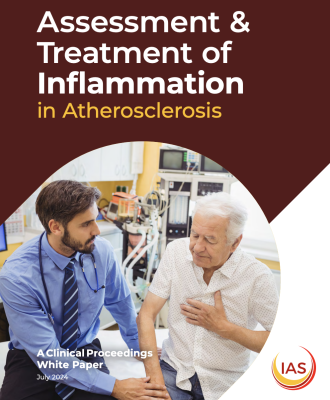
The International Atherosclerosis Society (IAS) has released a clinical proceedings white paper outlining the role of inflammation in atherosclerosis and the importance of early intervention. The paper is part of IAS’ Clinical Proceedings, a white paper series, which offers informational resources intended to raise awareness and address unmet needs in atherosclerosis. Image courtesy: IAS
July 23, 2024 — The International Atherosclerosis Society (IAS) has released a clinical proceedings white paper outlining the role of inflammation in atherosclerosis and the importance of early intervention. The new paper, “Assessment & Treatment of Inflammation in Atherosclerosis,” is part of IAS’ Clinical Proceedings, a white paper series, offering informational resources intended to raise awareness and address unmet needs in atherosclerosis.
In issuing this latest white paper, IAS recognized the four international expert panel members who contributed to its development:
- Peter Libby, MD (US), Mallinckrodt Professor of Medicine & Cardiovascular Specialist at Harvard Medical School and Brigham and Womens Hospital, who is IAS President and served as White Paper Panel Chair;
- Jessica M. Peña, MD, MPH, FACC, FNLA (US), Associate Professor of Clinical Medicine, Medicine and Associate Professor of Medicine in Clinical Radiology, Weill Cornell Medical College;
- Wolfgang Koenig, MD, FRCP, FESC, FACC, FAHA (Germany), German Heart Center in Munich; and
- Hiroaki Shimokawa, MD, PhD (Japan), Professor and Chairman, Division of Cardiovascular Medicine, Tohoku University Graduate School of Medicine
The four main sections addressed in the clinical proceedings white paper include:
- The role of inflammation in atherosclerosis is explained, noting that local inflammation in the artery wall participates directly in the development of the condition. Systemic, chronic inflammation can also promote the advancement of atherosclerosis and increase the risk of developing cardiovascular diseases.
- Using biomarkers to identify inflammatory risk in individual patients is now possible. Assessing levels of high-sensitivity CRP specifically can be used to help determine therapeutic strategies that may reduce the risk of major cardiovascular events.
- Interventions that may mitigate inflammatory risk include lifestyle modifications as well as pharmaceutical interventions. Policy changes could also mitigate the inflammatory risk of atherosclerosis.
- The burdens of disease are substantial. Atherosclerosis results in significant loss of life and greatly impacts household finances and economies worldwide.
"Atherosclerosis is a primary cause of cardiovascular disease, the leading cause of death worldwide. This paper underscores the persistent need for a more complete understanding of the role of inflammation in atherosclerosis progression among physicians globally, how to identify such inflammation, and how to mitigate the inflammation-associated risk of adverse cardiovascular events,” said Libby. He further stated, “These steps are of the utmost importance for the development of effective treatment strategies that can reduce the morbidity and mortality caused by atherosclerotic cardiovascular disease."
Established in 1979, the International Atherosclerosis Society is a global network of the world’s leading atherosclerotic cardiovascular disease experts who collaborate to develop mission centered programming that spans geographical and generational boundaries.
More information: www.athero.org


 February 03, 2026
February 03, 2026 









